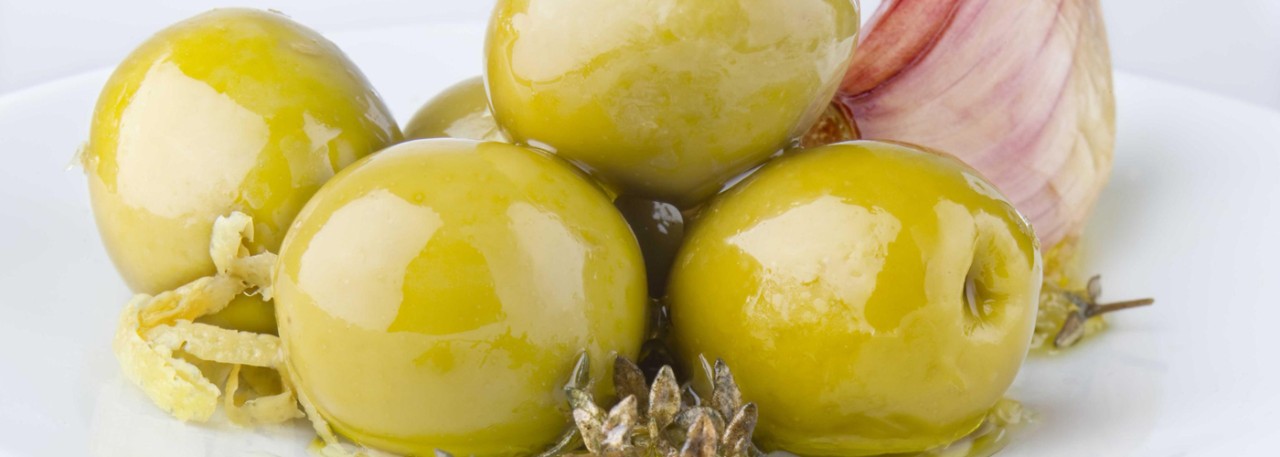.png.transform/rendition-xs/image_image%20(1).png)
Aceituna Aloreña de Málaga PDO
A seasoned table olive obtained from the healthy fruit of the Aloreña olive tree variety (Olea europea, L.), harvested at the correct degree of ripeness before it changes color, then split, sweetened in brine through natural fermentation and seasoned with thyme, fennel, garlic and pepper before it changes color, then split, sweetened in brine through natural fermentation and seasoned with thyme, fennel, garlic and pepper with spices or oleoresins based on these same natural products. This process is based on age-old customs, passed down from generation to generation over the years.
Tasting notes
The Aceituna Aloreña de Málaga Verde Fresca (fresh green) is light green in color with a very pleasant smell reminiscent of green fruit and grass, evoking its freshness and recent harvest. The seasonings typically used in its preparation are also evident. The Aceituna Aloreña de Málaga Tradicional (traditional) is a green-straw yellow color. Its smell evokes fresh fruit and the typical seasonings used in its preparation. This olive is less firm but retains its crisp texture, the flesh separates easily from the stone, and the skin is present. These olives have a faint bitterness, with lower astringency and a less noticeable sharpness than the fresh green olives. The Aceituna Aloreña de Málaga Curada (cured) is yellow-brown in color and smells of ripe fruit and fresh grass. The aroma of the seasonings and the lactic notes are noticeable. It has a firm and crisp texture. It has an acid flavor, loses its bitterness in the mouth and has a spicy aftertaste.
Other notes
The three types of “Aceituna Aloreña de Málaga” PDO, verdes frescas (fresh green), tradicionales (traditional) and curadas (cured), share physical and chemical characteristics that are exclusively due to the variety and the preparation method used in the area in which they are grown and processed:
- The olives are pickled in brine, sweetened solely in water and salt, and seasoned with thyme, fennel, garlic and pepper. The olives are fresh with a varying degree of fermentation.
- They have a free stone, which comes away easily from the flesh. This is a highly sought-after attribute in table olives.
- The presence, together with the olives, of natural seasonings: garlic, thyme, fennel and pepper. However, the olives may also be processed with spices and oleoresins based on these same natural products, in a quantity that varies between 1 and 3%.
Production / Processing method
- Aceituna Aloreña de Málaga Verde Fresca: The first process undergone by the olives is that they are split using stainless steel automatic machines working at high speed and adjusted so that the stone does not break during the operation. They then pass directly into tanks containing brine between 7 and 11 ºBaumé. This concentration drops quickly, so brine levels in these recipients usually needs to be regularly monitored in order to maintain the correct amount of salt. These tanks are placed in a cool place, where they can be stored provided the organoleptic and physical and chemical properties of the process are not altered, or in refrigerated rooms where they are kept at a maximum temperature of 15ºC.
A minimum of three days must have elapsed between when the olives were split and placed in brine to when they are packaged. During this stage, the olives gradually lose their bitterness and most of their sugars. Inevitably, a more or less intense fermentation also takes place at the same time, which in the case of this type of process, is not considered to be significant. Cold storage slows fermentation down and the olives retain the same properties as they had at the start of the harvesting period. When the olives are about to be packaged, the traditional seasonings for that particular production area are added to give them their distinctive aroma and flavor: Thyme (Coridothymus capitatus), Fennel (Crithmum maritimum), Pepper (Capsicum annum) and
Garlic (Allium sativum).
- Aceituna Aloreña de Málaga Tradicional: Following delivery, grading and splitting, these olives are placed in containers in premises without air conditioning where they are stored for at least 20 days before packaging for consumption. They can be stored in these conditions provided there is no alteration either to the organoleptic properties or to the physical and chemical properties typically found in this type of olive.
- Aceituna Aloreña de Málaga Curada: Following delivery and washing, the olives are placed without being split in fermenting tanks, where they undergo a curing process lasting at least 90 days before being packaged. In this type of preparation, acetic acid is usually added to ensure that the olives can ferment and be stored naturally. These brines are recirculated regularly and more salt is added to them as the concentration gradually weakens due to salt being absorbed by the olives.
The packaging for all three types of olives described above is done according to category, as set out in the applicable technical and sanitary regulations. This means that olives protected under the “Aceitunas Aloreñas de Málaga” PDO are necessarily of best or superior quality.
Geography / Relief and climate
The production area is clearly defined by a series of mountain ranges. It is bordered to the north by the mountain ranges of Valle de Abdalajis, Torcal and De las Cabras, with the Málaga mountains to the east, and to the south, the Sierra Blanca de Marbella and Alpujata de Mijas mountain ranges. The western boundaries are marked by the mountain ranges of Sierra de las Nieves, Prieta, Alcaparrín and De Aguas, with the only openings being at the mouth of the Guadalhorce river and where it flows into its namesake valley. The Guadalhorce is the largest river in the area and is surrounded by all the major plots of irrigated land in the vicinity. The lie of the land is very uneven, and the olive groves grow on marginal and poor soils located on the slopes that surround the Guadalhorce Valley. These olive groves are not of the highly productive sort found on cultivated farm land; these olive groves have low productivity but they yield excellent quality fruit.
Regulatory Council
Consejo Regulador de la DOP Aceituna Aloreña de Málaga
C/Caña, s/n – Cerralba.
29569 Pizarra (Málaga, Andalusia)
Tel: + 34 952 483 868 / 646 878 644
info@alorenademalaga.com
www.alorenademalaga.com
Sources:
- Spanish Ministry of Agriculture
There are three types of “Aceituna Aloreña de Málaga” PDO: verdes frescas (fresh green), tradicionales (traditional) and curadas (cured).


- Aceituna Aloreña de Málaga 1
- Aceituna Aloreña de Málaga 2

Pizarra (Andalusia)
